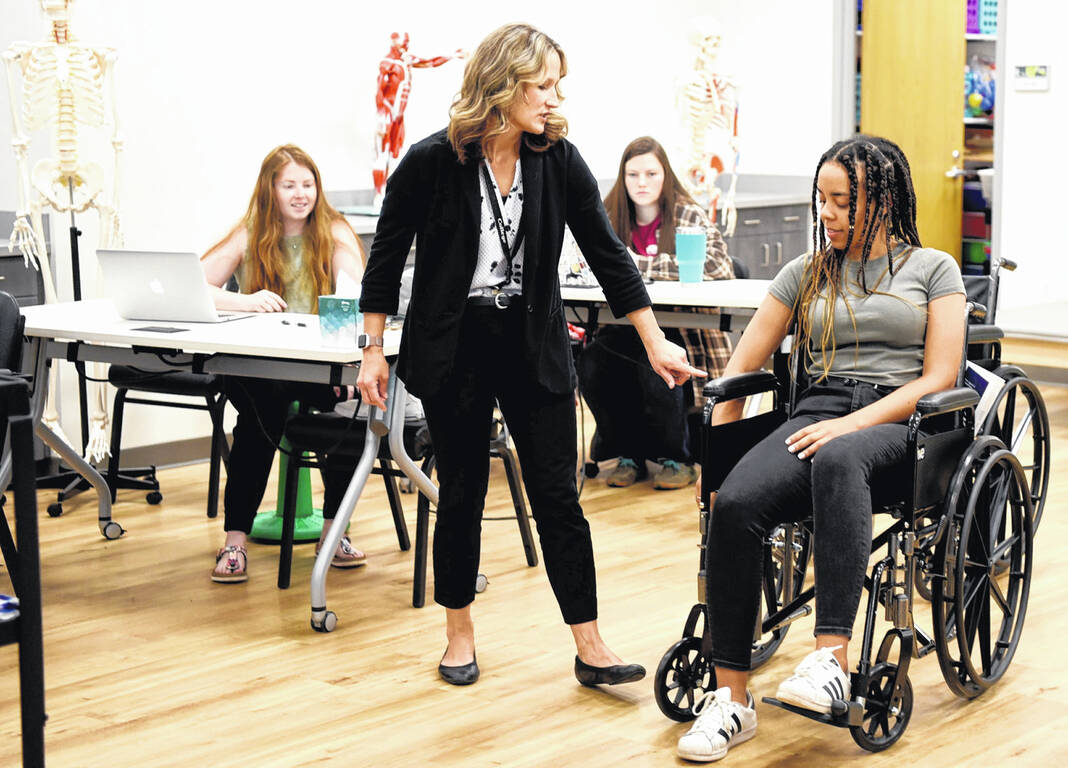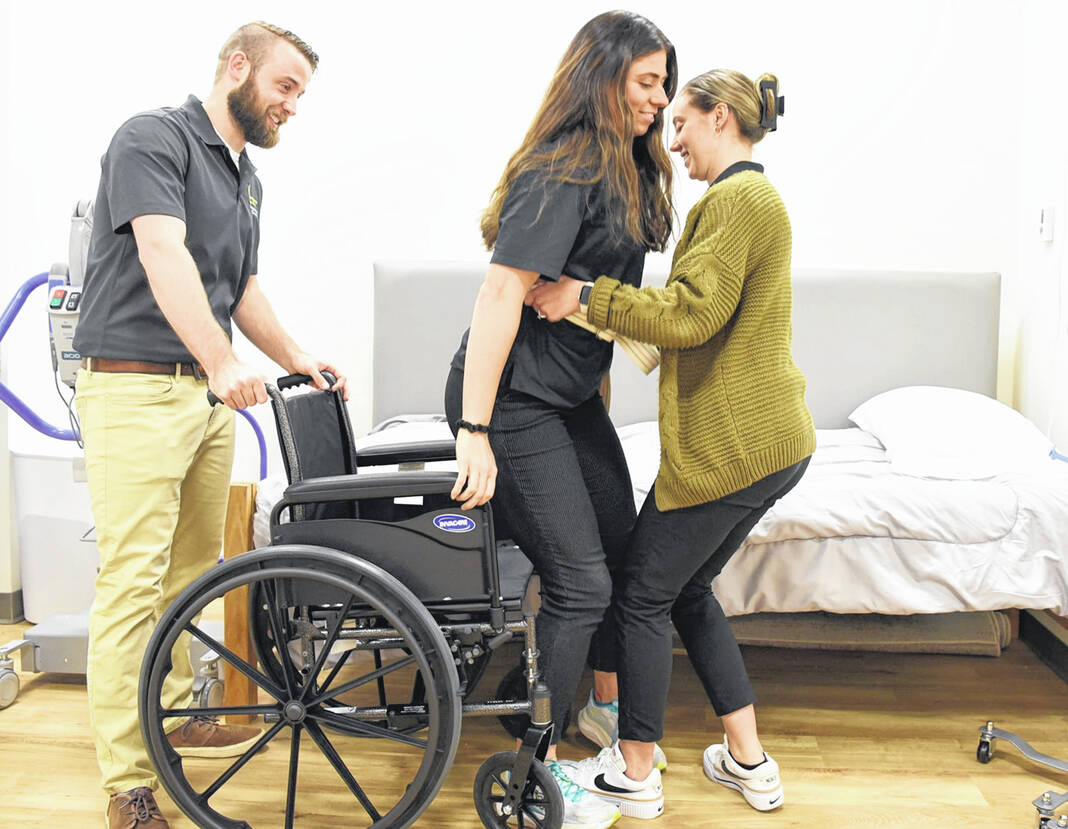
Assistant professor Erin Bales lectures on wheelchair positioning using student Maurita Oduor in the demonstration.

From the left, assistant professor Logan Fields oversees Madison Dietz and Abbie Grieser demonstrating a wheelchair transfer to a bed in the simulated apartment setting.
Wilmington College’s Master of Science in Occupational Therapy program achieved the most significant milestone yet in what has been described as its “very exciting and rewarding journey” since its establishment in 2021. The American Council for Occupational Therapy Education (ACOTE) in December formally granted the institution accreditation*.
Right on time, the accreditation paves the way for the inaugural student cohort to sit for their national certification examinations to become registered occupational therapists following their graduation in May.
Program Director Dr. Tiffany Lester, associate professor, said ACOTE’s official notification confirmed what the accreditors told them at the end of their October site visit.
“Verbally, they told us we passed our onsite accreditation with no areas of concern or noncompliance,” she said, adding that ACOTE’s official determination represents a monumental initiative coming to fruition. “It required great effort and detail. Each person on our faculty and staff has a unique background and skill set that complement each other. We worked hard to achieve this vital national accreditation.”
The College established its program in one of the fastest-growing health care fields with the inaugural cohort starting their studies in January 2022. The nascent program advanced through stages from its initial candidacy to pre-accreditation and now its national accreditation. The central points featured an exhaustive self-study culminating with the October site visit from a team of ACOTE accreditors, who determined the program satisfied 120 standards.
“It’s a very detailed process providing students with everything they need,” said Mallory Coleman, academic fieldwork coordinator and assistant professor. “The accreditors commented on how well our team worked together. They also mentioned how Corey and Wynn (Interim President Corey Cockerill and Interim Vice President Wynn Alexander) were so supportive and accessible during the site visit.”
The road to national accreditation experienced some bumps along the way. Founding director Dr. Cindy Hahn died unexpectedly in October 2022, some three months before the self-study report was due. Through “shock and sadness,” Coleman and Assistant Professor Erin Bales, an original faculty member, broke the news to the students, many of whom had decided to enroll at WC due to Hahn’s credibility and compelling belief in the emerging program.
“Cindy Hahn had such a wonderful vision for the program,” Coleman said, noting that, from the start, the rural-based, hands-on program promised a maximum 12:1 faculty/student ratio in lab settings, a small class size and a supportive faculty dedicated to student success. “Fortunately, Erin and I worked with Dr. Hahn for a year and understood her vision for a rural-focused program. We were all inspired to finish her vision.”
An outpouring of support came from occupational therapists from across the country. “It was a coming together of the OT community,” Coleman said. “Her passing was a shock, but it was beautiful to see the community come together.” The accreditors arrived exactly one year after Hahn’s untimely death.
The College found in Lester, Hahn’s successor, a leader in occupational therapy with a passion for working with underserved populations with limited access to resources and services. “We knew Tiffany would be a perfect fit for this role,” Coleman added.
The program features Lester, Coleman, Bales, additional faculty members Logan Fields and Emily Francisco and Heather Buyer, administrative assistant. “You will not find a team that’s more cohesive and works as well together,” Coleman added. “We work as a unit to support our students.”
In addition to the OT faculty and staff and the College’s senior administrators, the accreditors also met with OT students, fieldwork site mentors and members of the Master of Science in Occupational Therapy Advisory Board.
The January 2022 cohort of eight students is on track to become the program’s first graduates in May. They are spending their final six months in the program engaging in a required pair of Level II fieldwork experiences in which they work in the field with full-time occupational therapists. The group has been spread among entities that provide occupational therapy services, which may include outpatient clinics, schools, community health centers, acute care and inpatient rehabilitation facilities, intensive care units and neonatal pediatric and feeding clinics.
“Occupational therapy is a very broad field,” Coleman said. And, in her words, the 2024 graduates’ prospects for employment are “Fantastic!” Indeed, the Bureau of Occupational Outlook Handbook cited Bureau of Labor Statistics predictions that occupational therapy jobs will grow in the United States at 12 percent a year through 2032. The expected salary range for new OTs in 2022 was between $79,000 and more than $100,000, with a median annual pay of $92,000.
“The jobs and pay are increasing,” Coleman added. “The need is there, especially in rural areas.”
Many new OTs might have access to multiple practitioners in an urban hospital setting compared to those in rural facilities that have only a single or no certified therapists. With that in mind, the College established a Rural Mentorship Program in which graduates will have access, during their first year of practice, to veteran OT practitioners who have agreed to mentor the new professionals.
“This support is a very unique part of our occupational therapy program,” Lester said. “It will help ensure our graduates’ success.” Coleman added, “It’s been a very exciting and rewarding journey. Cindy Hahn’s vision of a rural focus has blossomed into an exciting and unique program.”
The January 2023 cohort includes 11 students who are on track to graduate in December 2024 with a new cohort beginning their studies in January 2024. The growing program can accommodate a maximum of 24 students per cohort.
The accreditation news for Bales, the faculty/staff member with the longest term of service at WC, is especially sweet. “It’s been a challenging yet very rewarding process,” she said. “Our students are embracing occupational therapy and are passionate about rural practice. We’re excited for the potential and future of the program and excited for our students and their future!”

